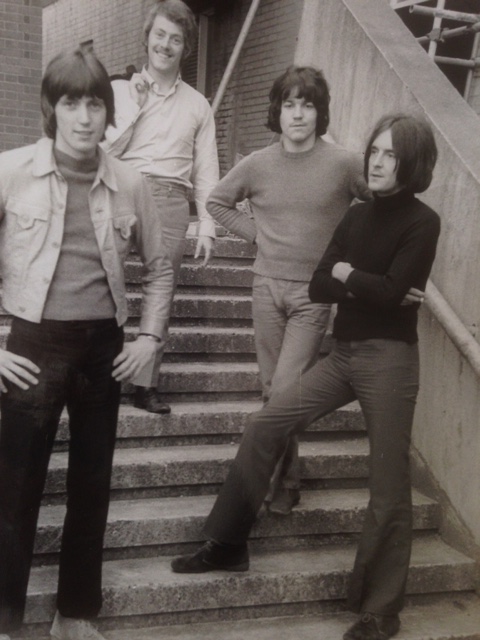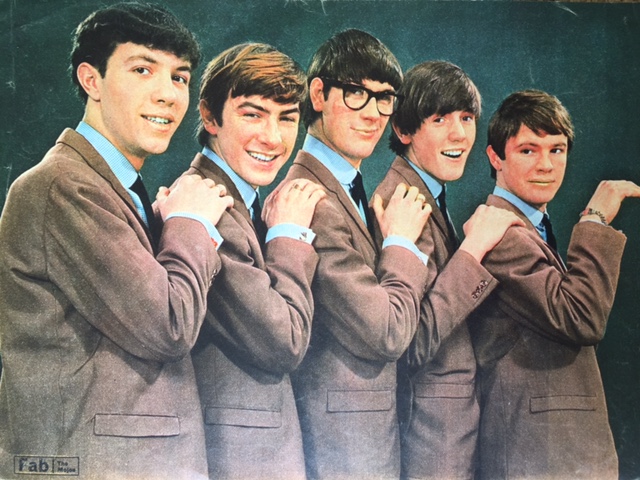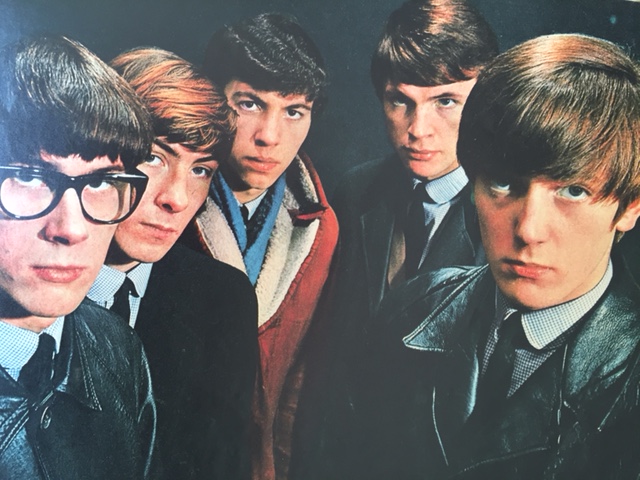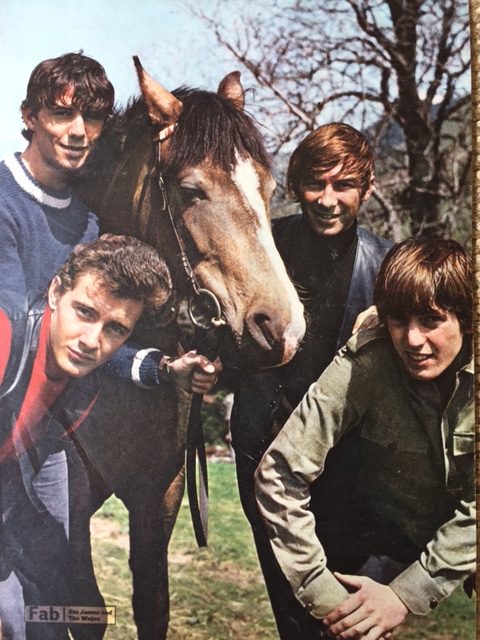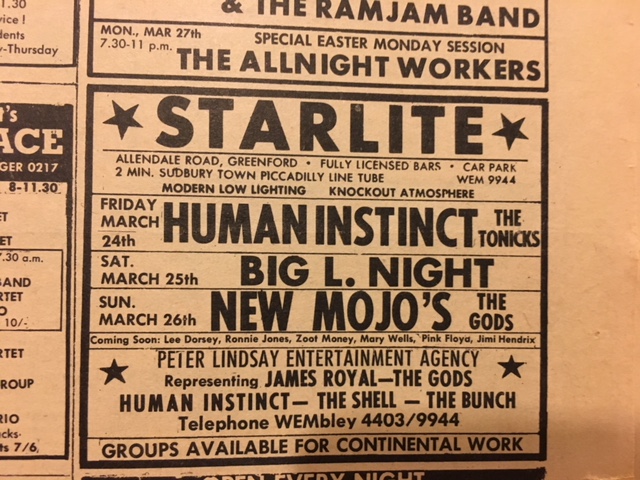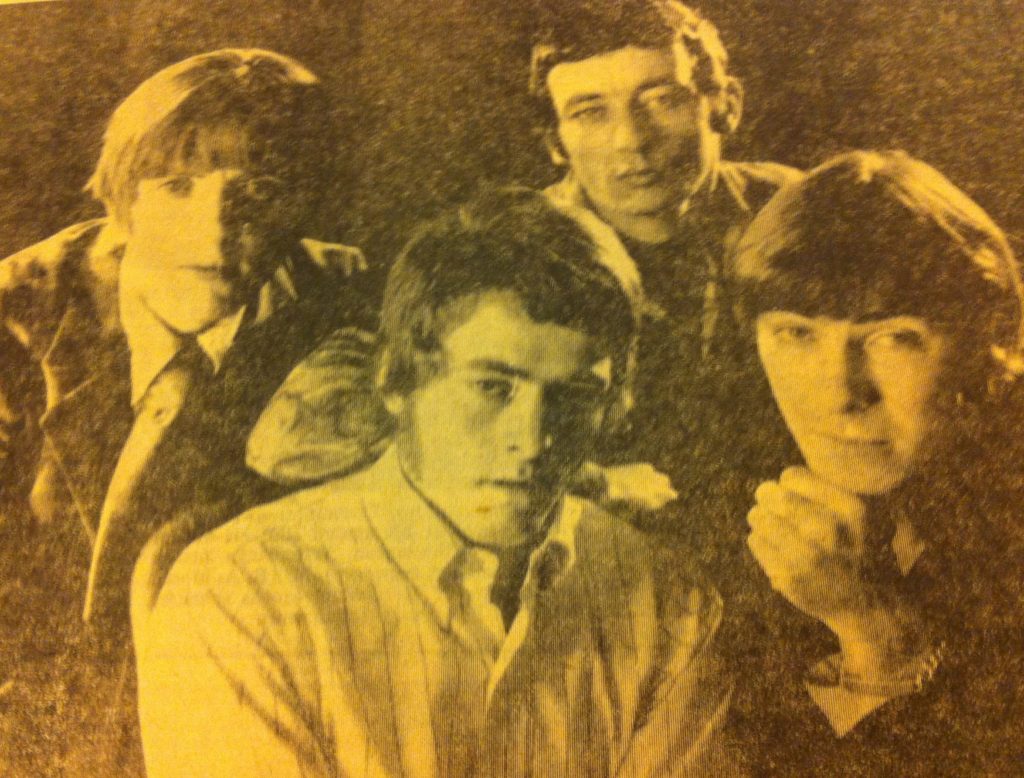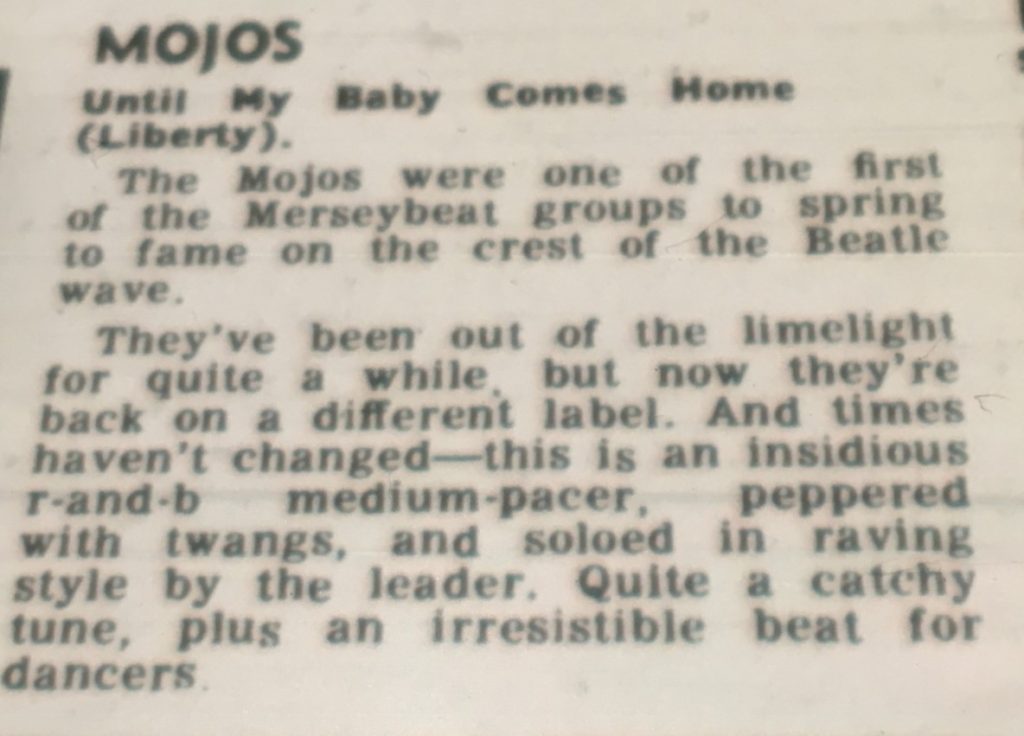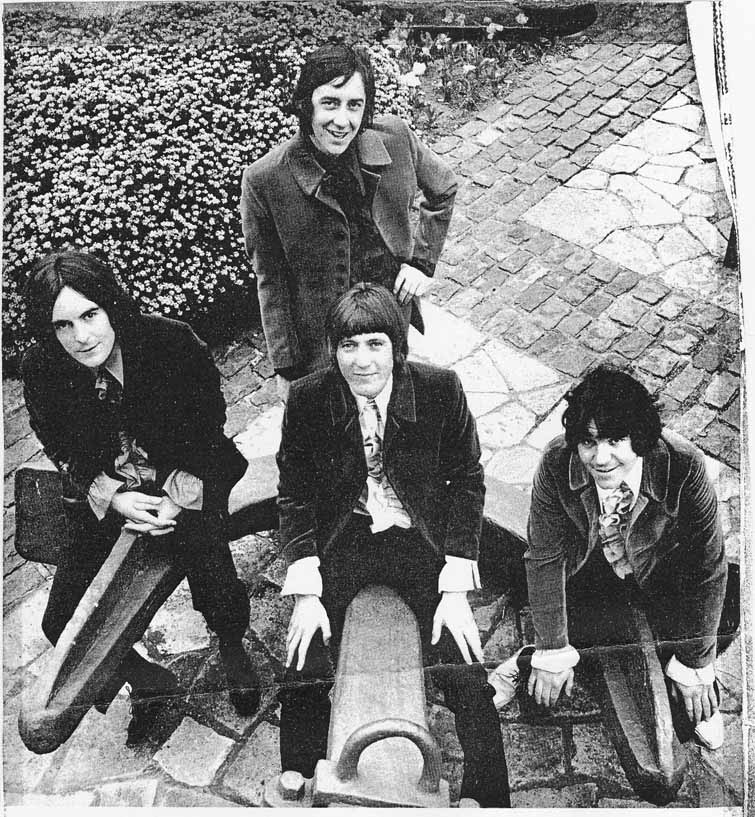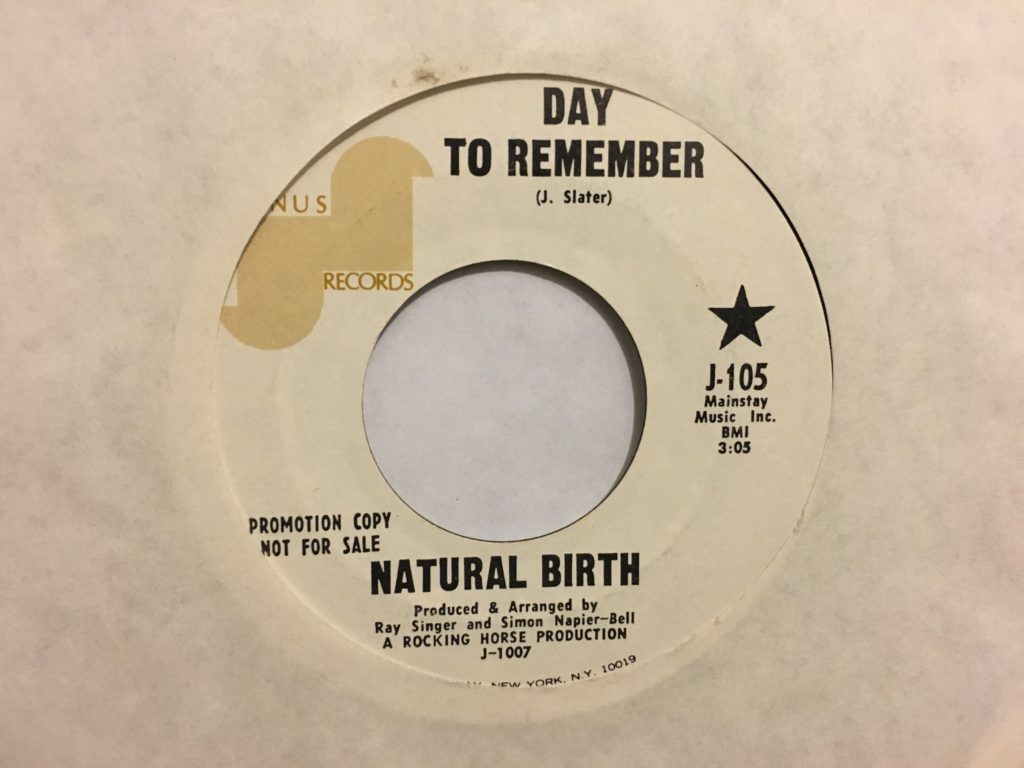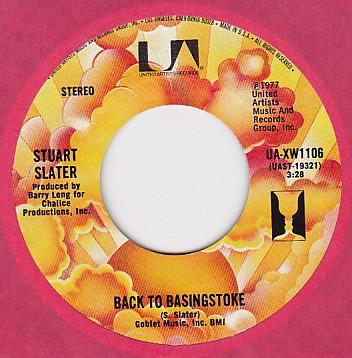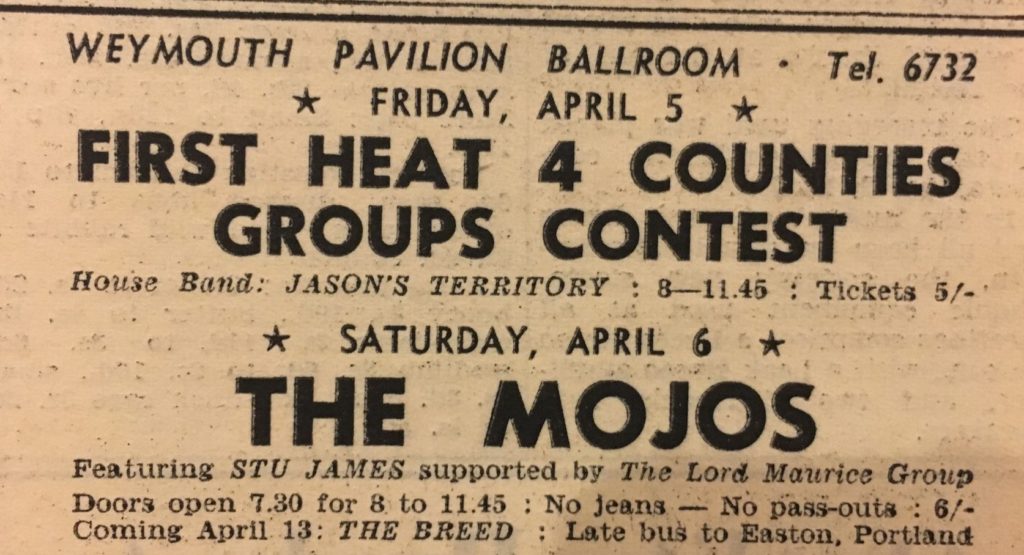By Nick Warburton
On 7 June 1968, Liberty Records released “Until My Baby Comes Home”, a one-off single by The Mojos.
The Mojos, 1968. Left to right: Stu James, Martin “Cuddles” Smith, Eddie Harnett and Duncan Campbell
To anyone familiar with the British beat scene of the early Sixties, The Mojos were one of the leading Merseybeat groups and, like The Beatles, were among the first wave of bands from Liverpool to storm the UK charts, in their case with the unforgettable “Everything’s Al’ Right”, a rock ‘n’ roll tour de force powered by singer Stu James’s (b. Stuart Leslie James Slater, 14 July 1945, Liverpool) powerful lead vocals and Terry O’Toole’s dynamic piano playing. Peaking at #9 on the UK charts, it was The Mojos’ biggest hit.
But the equally impressive “Until My Baby Comes Home”, a storming, mod-rocker was The Mojos in name only. Although Stuart James (who worked as Stuart Slater from early 1968) provided the superb, emotionally charged lead vocal, the group was miles away from the Merseyside band that cut a cache of singles for Decca between 1963 and 1967, both in style and sound.
In fact, by the time The Mojos signed with Liberty Records, the group was largely comprised of musicians from Southampton on England’s south coast. It should have been a positive new dawn after years of struggling for recognition, but tragically the group’s potential was cut short.
To find out how Stu James re-launched The Mojos in the early months of 1968, it helps to go back to the very start and September 1962 when the singer/pianist signed up with Anfield, Liverpool group, The Nomads, after nearly joining The Undertakers.
Formed earlier that year as a duo by lead guitarist Roy Woods and bass player Keith Karlson (b. Keith Alcock, 14 August 1944, Liverpool), The Nomads were a blues-based rock group, who briefly featured future Easybeats’ drummer Snowy Fleet from The Four Musketeers before he emigrated to Australia, his place taken by Jon “Bob” Conrad (sometimes spelt Konrad, b. 3 October 1944, Liverpool).
Shortly before Stu James’s arrival, the band added rhythm guitarist and singer Adrian Lord (real name: Adrian Wilkinson), who took over from Roy Woods. Then, in August 1963, on George Harrison’s recommendation, they added pianist Terry O’Toole and recorded the track, “My Whole Life Through”, which was picked up by Oriole Records for the This is Merseybeat compilation LP.
When they found out that another group called The Nomads from Southend-on-Sea had registered the name, the musicians renamed the group The Mojos, taking the name from a popular Muddy Waters song in their set-list, “I Got My Mojo Working”.
The Mojos won a song-writing competition soon afterwards, the fruits of which were a production and publishing contract with Aberback Music. The musicians were soon whisked into the studio to cut their debut single “They Say” c/w “Forever”, which was erroneously released on Decca as The Mojo’s but to limited interest on 30 August 1963.
In September, Adrian Wilkinson left and former Faron’s Flamingos lead guitarist Nicky Crouch (b. 9 February 1943, Aintree, Liverpool) joined what would become the definitive early line-up.
The Mojos, 1964, left to right: Keith Alcock, Nicky Crouch, Jon Conrad, Stu James and Terry O’Toole
Like many Merseyside bands, The Mojos headed to Hamburg in what was then West Germany for a six-week residency at the famous Star Club. While there, the group cut the single that would come to define its career.
“We recorded ‘Everything’s Al’ Right’ in a church in Hamburg,” recalls James. “I’ve always thought it was plucked from the heavens and it really sounded different on the radio.”
Released on 6 March 1964 and backed by the superb “Give Your Lovin’ To Me”, the single stormed up the UK charts and peaked at #9. However, follow ups, “Why Not Tonight” c/w “Don’t Do It Anymore”, issued on 5 June 1964 (UK #25) and “Seven Daffodils” c/w “Nothin’ At All”, released on 28 August 1964 (UK #30) failed to match the commercial success of the band’s breakthrough single.
James admits the group had poorly chosen material foisted on to musicians by their production company, which also had a label deal that went through Decca Records.
“All with a benefit of hindsight, you slam your foot on the brake and say, ‘Right, what have we really got for a follow up?” ‘Why Not Tonight’ was ‘Everything’s Al’ Right’ written sideways. It really was… It was completely contrived.”
As for “Seven Daffodils”, James recalls that the song “stormed it every night on stage”. Unfortunately, the single’s release was poorly timed.
“We were really pleased with our version and the day ours came out, blow me down, this group called The Cherokees from Leeds put it out as well,” he remembers.
In October 1964, The Mojos faced a mass exodus as Terry O’Toole, Keith Karlson and Bob Conrad all departed to form The Epics; O’Toole later put together a rival Mojos in Liverpool.
The Mojos before line-up change, 1964, left to right: Jon Conard, Nicky Crouch, Keith Alcock, Terry O’Toole and Nicky Crouch
James and Crouch relaunched The Mojos bringing in ace drummer Aynsley Dunbar (b. 10 January 1946, Liverpool), who went on to play with a who’s who of rock royalty, including Jeff Beck and Jefferson Starship to name a few, and future actor and half of the Professionals, bass player Lewis Collins (b. 26 May 1946, Bidston, Birkenhead, d. 27 November 2013), son of the band’s road manager Bill Collins. Both were seasoned musicians from the local scene.
“Aynsley was an incredible drummer and an absolute natural,” says James. “Unlike Lewis I had no surprise at all that he made it because he was so good on the drums. There were nights when we’d go on and we wouldn’t get a lot of clapping until he came in on his drum solo.”
Besides working with a few local Liverpool bands, Lewis Collins had previously worked as a hairdresser with Paul McCartney’s brother Mike McGear. His father Bill would soon discover Welsh beat group, The Iveys, who shared a bill with The Mojos in spring 1966, and would take them under his managerial wing, later introducing them to Paul McCartney, who signed the band to Apple where they subsequently found success as Badfinger.
The Mojos after line-up change, left to right Lewis Collins, Aynsley Dunbar, Nicky Crouch, Stu James
“Lewis was in the band because of his father,” says James. “I don’t say there’s anything sinister in that at all. His father was our road manager and his son played the bass. When he suggested his son for the gig it made sense. We all knew him because he’d been helping with the gear.”
The new-look Mojos’ first release on Decca was “Comin’ On To Cry” c/w “That’s The Way It Goes”, which was released on 9 April 1965.
Unfortunately, the single, and its follow up, “Wait A Minute” c/w “Wonder If She Knows”, issued on 10 September 1965 as Stu James & The Mojos, both failed to crack the charts.
Decca began to lose faith in the band and wouldn’t sanction another single. In September 1966, with the band now based in London, Dunbar saw the writing on the wall and jumped ship to join John Mayall’s Bluesbreakers, briefly replaced by Stan Bennett. Lewis Collins also departed soon afterwards, working with Robb Storme & The Whispers.
“The problem was we didn’t have anyone guiding us to say, ‘Look, just stick to what you do best’,” says James looking back. “We were all over the shop [stylistically]. On stage, we played ‘Spoonful’ and a lot of genuine blues. Maybe we should have stuck to that.”
James and Crouch rebuilt the band again from scratch bringing in bass player Deke Vernon from Birmingham and Southampton drummer Martin “Cuddles” Smith (aka Steve Snake). The new formation recorded one final single for Decca, “Good-Bye Dolly Grey” c/w “I Just Can’t Let Her Go”, issued on 3 February 1967, before the label dropped the band. Allegedly, the musicians briefly backed Paul and Barry Ryan during this period.
The new-look Mojos struggled through the rest of 1967, which included a bizarre extended engagement at a luxury hotel in the Ivory Coast in West Africa.
“We were there for the best part of three months,” remembers James. “It was a good venue. It was more like a Four Seasons and they had a disco down in the basement. It reminded me of Hamburg a bit because you’d play until everyone had gone home.”
The New Mojos, Starlite, March 1967
James had got married by this point to his first wife Jeanette, who came from Romsey in Hampshire. Through his partner, who can be seen posing in full Swinging London attire in a photo taken in Carnaby Street with the Collins-Dunbar line-up in mid-1966 (and where the singer recalls David Bowie was “lurking around” in the background of the photo session holding a violin), James decided to relocate to Southampton. The move prompted a split in the band as Crouch was not prepared to make the move to the south coast. Decades later, the guitarist would form his own version of The Mojos.
The Mojos, December 1967, left to right: Stu James, Martin House, Deke Vernon and Nicky Crouch
Choosing to use his real name Stuart Slater, Stu James signed to Avenue Artists, who put together a new group around him, which retained Martin Smith and added lead guitarist/singer Eddie Harnett (b. 19 June 1949, Southampton, Hampshire) and bass player/singer Duncan Campbell (b. 19 December 1947, Cheltenham, Gloucestershire). Slater resumed his position on electric piano and also played rhythm guitar.
According to David St John’s superb website on Southampton bands, Harnett, who died in January 2011, had previously worked with Eastleigh band, The Planets, which became The Unforgiven and The Courtelles. Campbell meanwhile had been a member of The Countdowns.
“We were managed by Mr Len Canham [at Avenue Artists’ entertainment agency], who [also] managed Dave Dee, Dozy, Beaky, Mick and Tich,” says Slater.
“Len Canham was part of the Southampton entertainment scene with the agency and he was also the manager of the ballroom at the [city’s] pier for a number of years,” adds Campbell, who lives in Tenerife in the Canary Islands.
The bass player recalls that the new formation had three songwriters in Slater, Harnett and himself, and the musicians used to lay down tracks as home-made recordings.
“Eddie was quite a prolific song-writer,” he says. “Possibly the best song he ever wrote was ‘Goodbye Sunshine’. We used to play that at gigs.”
Thanks to Bob James, who was a partner of Len Canham’s in Avenue Artists’ entertainment agency, the quartet secured a recording deal with Liberty Records and were linked with the label’s Andrew Lauder.
“I am sure it was Bob James who set the whole thing up,” says Campbell. “[The single] was done at Bob Potter’s recording studio [in Camberley, Surrey].”
For the two tracks, the label chose “Until My Baby Comes Home” and “Seven Park Avenue”, both penned by Slater, despite the others having original material to record.
The A-side is a bona fide classic, which has since been picked up by various compilation CDs, most notably Cherry Red Records’ superb Looking Back. Slater explains that the flipside, “Seven Park Avenue” was written about the B&B he stayed in briefly in Golders Green, just before the split with Nicky Crouch.
Tragically, although the single was favourably reviewed, it failed to make any headway on the UK charts.
“I didn’t sense that there was huge enthusiasm for that record at the time,” says Slater. “It certainly didn’t get any heavy promotion and marketing.
“I don’t know why it didn’t make some sort of impact… the very fact that it was a production deal into the record as well would have been helpful. The copyright would be owned by Avenue Artists.”
The same month the single appeared, Martin Smith departed and Tony House (b. 19 March 1949, London) assumed the drum duties.
Mojos review in NME in June 1968
Not long after, the group made the first of several trips to West Germany. More tantalising is the possibility that some rare, previously unreleased material may be available in the BBC vault.
“One of my favourite sessions we ever did was at the BBC and we did a version of ‘Walk In My Shadow’ by Free,” says Slater.
“I always thought it was the best thing we ever did. We only did two songs. It was a lunchtime session and people like [disc-jockey] Emperor Rosko would be on.”
The Mojos: left to right at the front: Duncan Campbell, Stuart Slater and Eddie Harnett. at the back: Tony House (photo from David St David)
Campbell recalls the band also did a couple of BBC road shows: “We were pop/rock. We played a lot of pop songs and we wrote, between us, a lot of pop songs but our hearts were more inclined towards rock.”
The Mojos continued to gig incessantly throughout 1969 during which time local Southampton drum legend Danny Barbour, who’d played with Ricky Brown & The Hi-Lites and The Time among others, took over from Tony House.
Then, as the year turned, The Mojos’ fortunes appeared to have turned. “[Canham] dragged Simon Napier-Bell and Ray Singer along to see us at a gig and they were quite impressed and things moved quite fast with those two guys,” says Campbell.
“It was still The Mojos but it was decided, [we needed a] name change, and the band became, much to my disgust as Natural Birth. It was all out of our hands.”
Produced by Napier-Bell and Singer, the single “Life Is What You Make It To Be” (credited to Rock Horse) c/w Slater’s “Day To Remember” had the commercial potential to be a sizeable hit but success would continue to elude the band.
Campbell remembers that The Mojos were performing at Winchester Town Hall with Emperor Rosko on a Friday night and the bass player handed the DJ a copy of the Natural Birth single about six weeks before it was due to be released.
Rosko then proceeded to plug the single on his Saturday morning radio show the following day. The group had hoped the A-side would make the BBC radio play list but the disc jockey’s action nixed that possibility.
“I know I am being hypothetical but it probably would have been a top 20 hit, which would have been the first step on the rung up the ladder,” argues Campbell.
A comment on David St David’s Southampton music scene website notes: “Interestingly, a lot of people who’ve heard [‘Life Is What You Make It To Be’] over the years have remarked on how much the vocal harmonies – with several studio overdubs – sound very much like Queen.”
Surprisingly, given the single’s UK chart failure, the label also issued the single in the US (Janus Records) the Netherlands (CBS) and Germany (Philips); the latter featured another Rock Horse composition “Mission Completed”, which did not appear anywhere else.
“I heard it was released in the States simply to try and recoup their recording costs,” suggests Campbell.
Sadly, the single proved to be The Mojos/Natural Birth’s swansong. Soon afterwards, Slater split with the band and was replaced by singer Cliff Barks. The group resumed gigging locally as The New Mojos.
“Simon Napier-Bell and Ray Singer had a lot of hope for the band,” remembers Campbell. “There was a meeting to talk about a first album because they were convinced that this first single was going to be top 20… Remembering that there were four song-writers in the band [and] Stuart wrote the best songs at the time… but he asked for a guarantee about the number of his songs on the album which I wasn’t in agreement with.”
When the group splintered in the 1970, Harnett briefly joined local legends Fleur De Lys before moving on to a succession of groups.
As for Slater, he would revert to his Stu James stage name and cut two singles with Bradley Records in 1974. He then released a one-off single for United Artists Records in 1977 as Stuart Slater before a final lone release as Stu James two years later for Philips.
During this period, he lived with singer Stephanie De Sykes and together they wrote two UK Eurovision Song Contest entries Co-Co’s “The Bad Old Days” and Prima Donna’s “Love Enough for Two”. Their son Toby was lead singer in 1990s pop band, Catch. Slater ran Chrysalis Music during the 1980s and currently lives in southwest London.
Notable gigs (Liberty Records period):
- 23 February 1968 – The Cobweb, St Leonards, East Sussex with Fingers Lee
- 6 April 1968 – Weymouth Pavilion Ballroom, Weymouth, Dorset
- 3 May 1968 – Steering Wheel, Weymouth, Dorset
- 15 June 1968 – Steering Wheel, Weymouth, Dorset
- 26 June 1968 – Mackadown, Kitts Green, West Midlands with Morning Dew
- 1 July 1968 – Belfry, Wishaw, West Midlands
- 19 July 1968 – Weymouth Pavilion Ballroom, Weymouth, Dorset (billed as The Mojos with Stu James)
- 9 August 1968 – Punchbowl, Latchworth, West Midlands
- 12 September 1968 – Southampton Pavilion, Southampton, Hampshire with Fusion
- 13 October 1968 – Byron, Greenford, London
- 19 October 1968 – Union Rowing Club, Nottingham
- 28 November 1968 – Hatchetts Playground, Piccadilly, London
- 29 November 1968 – Mistrale, Beckenham, Kent with Kaleidoscope
- 7 December 1968 – Rhodes Centre, Bishop’s Stortford, Herts with Pure Medicine
- 29 January 1969 – Reading University, Reading, Berkshire with The Inflatable Tags
- 6 February 1969 – Hatchetts Playground, Piccadilly, London
- 6 March 1969 – Hatchetts Playground, Piccadilly, London
- 8 March 1969 – Hastings Pier, Hastings, East Sussex with The Beat Syndicate
Many thanks to Stuart Slater (including for the photos), Duncan Campbell, David St John and Manfred Kuhlmann.
